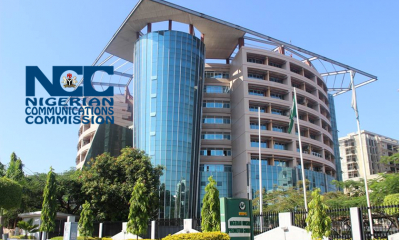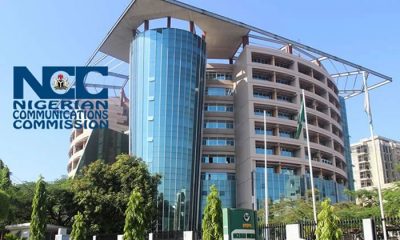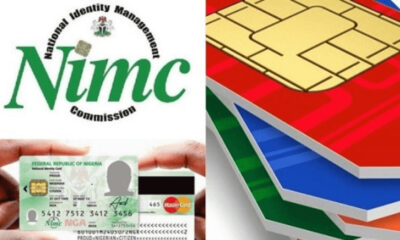News
Block SIM cards minutes after reportedly stolen, NCC tells telcos

Block SIM cards minutes after reportedly stolen, NCC tells telcos
The Nigerian Communications Commission (NCC) has mandated that all telecommunications companies (telcos) block stolen subscriber identification module (SIM) cards within five minutes of receiving a report from subscribers.
The NCC has stated that any subsequent usage of the stolen SIM should not incur charges for the consumer from the time the report is made. In its recent publication, ‘Quality of Service Business Rules,’ released in August 2024, the NCC also unveiled several new standards designed to enhance customer service in the telecommunications sector. These guidelines establish minimum service standards, relevant measurements, and key performance indicators (KPIs) for telecom operators.
A key requirement outlined in the new regulations is that telecommunications companies (telcos) must ensure that subscribers receive assistance within 30 minutes of arriving at service centers.
“It must not exceed 30 minutes. The licensee shall provide means of measuring the waiting time, starting from the time of arrival at the premises,” NCC said.
The commission has also introduced additional improvements to customer service interactions beyond reducing wait times.
READ ALSO:
- Former ICPC Chairman Justice Emmanuel Ayoola dies at 90
- JUST IN: Tragedy as Sokoto monarch ‘dies’ in kidnappers’ den
- (JUST IN): Scores feared killed as soldiers, bandits clash in Plateau
The NCC stipulated that customers must be able to speak with a live representative within five minutes.
It said: “Maximum number of call-attempts before connecting to customer care lines should not be more than three (3) times,” the commission said.
“Maximum number of rings before a call is answered by either an IVR machine or a live agent should not be more than five.
“Where a customer decides to speak to a live agent, the maximum duration allowable on the queue/IVR should be 5 minutes before answer.
“In exceptional cases where live agent may be unavailable within 5 minutes to answer the call, a customer should be given an option to hanging up to be called back within a maximum time of 30 minutes.”
Concerning internet services, the NCC has stated that internet outages should not last longer than two hours. The regulator specified that outages exceeding this duration should only occur in cases of lawful disconnection.
Additionally, the commission issued warnings regarding the deactivation of subscriber lines. The NCC indicated that if a subscriber’s line is inactive and not used for any revenue-generating activity for a year, it is at risk of being blocked.
The regulator advised subscribers to request line parking if they have valid reasons for not using their lines, in order to prevent losing their numbers. “A subscriber line may be deactivated if it has not been used within six months for a revenue-generating event (RGE). If the situation persists for another 6 months, the subscriber may lose his/her number, except for network-related faults inhibiting an RGE,” NCC said.
The NCC stated that these measures are aimed at advancing its goals of developing and monitoring performance standards and metrics related to the quality of telephone and other communication services in the country.
Block SIM cards minutes after reportedly stolen, NCC tells telcos
News
Currency in circulation now N4.8tn – CBN report
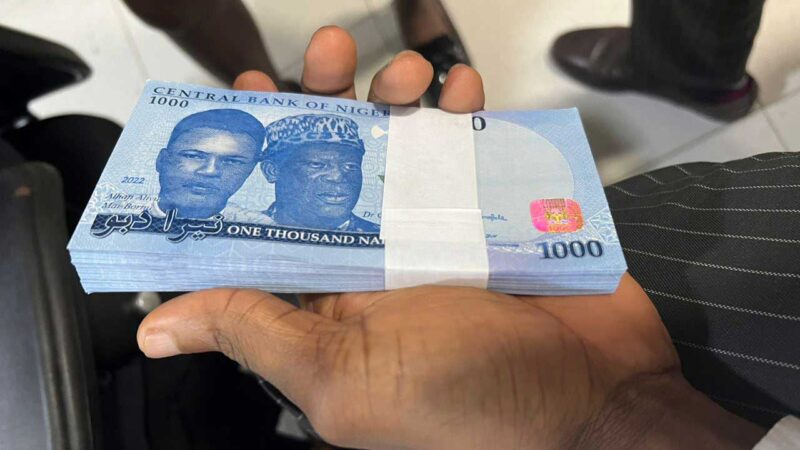
Currency in circulation now N4.8tn – CBN report
Currency in circulation has reached an all-time high of N4.8 trillion as of November 2024, recording over seven per cent increase from the previous month.
Also, currency outside banks grew significantly in the same month hitting an all-time high of N4.6 trillion from the N4.2 trillion in the month of October.
These figures were contained in the money and credit supply data from the Central Bank of Nigeria (CBN).
The currency in circulation is the amount of cash–in the form of paper notes or coins–within a country that is physically used to conduct transactions between consumers and businesses.
It represents the money that has been issued by the country’s monetary authority, minus cash that has been removed from the system.
Similarly, currency outside a bank refers to cash held by individuals, businesses and other entities that is not stored in banks.
The currency outside the bank represents about 96 per cent of the currency in circulation.
Nigerians have in recent times been facing acute cash shortage with banks limiting daily withdrawal at Automated Teller Machines (ATMs) to N20,000 irrespective of the number of accounts held by an account owner.
READ ALSO:
- Cross River man kills mother, dumps body inside well
- El-Rufai mocks Reno Omokri with throwback protest photos against Tinubu
- Warri refinery: Marketers hopeful of further petrol price drop
According to the latest data, the currency in circulation grew by seven per cent to reach 4,878,125.22 from 4,549,217.51 in October.
Currency in circulation has grown steadily in the outgoing year 2024 with over one trillion naira added to cash in circulation after starting the year with N3.65 trillion in January.
In February, the currency in circulation slightly increased to N3.69 trillion representing an increase of N43 billion or 1.18 per cent from the January figure.
March also saw an appreciable increase to N3.87 trillion while it further increased to N3.92 trillion in the following month of April.
The growth trajectory continued in May with the currency in circulation increasing slightly to N3.97 trillion, an increase of N42 billion or 1.07 per cent while it reached an all-time high of 4.04 trillion, an increase of 2.11 per cent from May.
The July figure also rose marginally with the currency in circulation settling for N4.05 trillion before growing to N4.14 trillion in August and N4.43 trillion in September and N4.5 trillion in October.
In the same vein, currency outside banks grew from N4.2 trillion in October to N4.6 trillion in November, showing increasing preference for other means of storing outside bank deposits.
Economist, Dr. Paul Alaje attributed the development to the expanding money supply, adding, “Money supply is expanding but this may not necessarily be in cash. As it is expanding, it will necessarily induce inflation. But you can’t blame the people. People must look for money. How much was bottled water last year, how much is it today? All of this will induce inflation. If you now ask, what is the cause of inflation? Is it money supply itself or a devaluation policy? It is a devaluation policy. Money supply is an offshoot. So the Central Bank is raising interest rates to actually reduce money supply but the more they try the more money supply expands.”
He stated that the floatation policy of the CBN has created inflation, adding, “It is like chasing one’s tail and I don’t know if you are going to catch it.”
Currency in circulation now N4.8tn – CBN report
News
Tinubu not telling Nigerians the truth, says Sule Lamido

Tinubu not telling Nigerians the truth, says Sule Lamido
President Bola Tinubu has been accused of not being forthright about the true state of Nigeria under his administration.
Former Jigawa State Governor and senior Peoples Democratic Party (PDP) member, Sule Lamido, made the accusation while speaking on the BBC Hausa programme Gane Mini Hanya.
Lamido criticized both Tinubu and former President Muhammadu Buhari for what he described as a lack of transparency in governance.
“Buhari’s and Tinubu’s governments are not being transparent with Nigerians unlike during the time when PDP was in power where everything was transparent and open to all Nigerians,” Lamido said.
READ ALSO:
- Odili: Fubara prevented Wike from turning Rivers to private estate
- Putin apologises over Azerbaijan plane crash reportedly shot down
- 256 terrorists, two logistics suppliers arrested in one week – DHQ
He accused the two administrations of relying on propaganda rather than providing citizens with accurate information.
Lamido also expressed concerns over President Tinubu’s recent loan requests, questioning the logic behind them. “If Nigerians are being told the truth then there is nothing wrong with that, but how would you budget N30tn, generate N50tn and then request loan when you have a surplus of N20tn,” he said, referencing last year’s budget.
He described the situation as “reckless” and “selfish,” adding, “This recklessness and clear-cut selfishness is not done anywhere in the world, but yet you find (some) Nigerians supporting it. Visit social media and see how APC is being criticised, being referred to as calamity, yet you find some protecting it.”
Tinubu not telling Nigerians the truth, says Sule Lamido
News
Nigeria Customs Service begins 2025 recruitment [How to apply]

Nigeria Customs Service begins 2025 recruitment [How to apply]
The Nigeria Customs Service (NCS) has announced the commencement of its recruitment exercise, assuring Nigerians that the process is entirely free and fair.
The agency has cautioned the public to be vigilant against scammers who may attempt to exploit unsuspecting applicants during the recruitment period.
Applications are invited for positions in the Superintendent, Inspector, and Customs Assistant cadres as part of the Service’s plan to recruit 3,927 officers in 2025.
This initiative is aimed at enhancing trade facilitation and supporting Nigeria’s economic recovery efforts.
“Our recruitment is entirely free and fair. At no stage do we charge fees. Anyone requesting payment is a scammer,” the agency emphasized, urging applicants to be wary of fraudulent schemes.
READ ALSO:
- Dangote, Tinubu, Lookman, Badenoch named among 100 most influential Africans in 2024
- Heavy security in Ilesa as ex-Osun deputy gov emerges new Owa-Obokun
- Hacker has stolen N180m from my NGO account – VeryDarkMan cries out
The NCS outlined eligibility criteria, stating that applicants must be Nigerian citizens by birth, possess a valid National Identification Number (NIN), and have no criminal record or ongoing investigations.
Academic qualifications for the three cadres are as follows:
Superintendent Cadre: A university degree or Higher National Diploma (HND) along with an NYSC discharge or exemption certificate.
Inspectorate Cadre: A National Diploma (ND) or Nigeria Certificate in Education (NCE) from an accredited institution.
Customs Assistant Cadre: At least an O’Level certificate (WAEC or NECO).
In addition to these qualifications, the NCS stressed that all applicants must be physically and mentally fit, providing evidence of medical fitness from a recognized government hospital.
Nigeria Customs Service begins 2025 recruitment [How to apply]
-

 Sports2 days ago
Sports2 days agoAnthony Joshua prostrates before Governor Abiodun during Ogun visit
-

 metro2 days ago
metro2 days agoWanted terrorist commander, Bello Turji, a dead man walking – DHQ
-
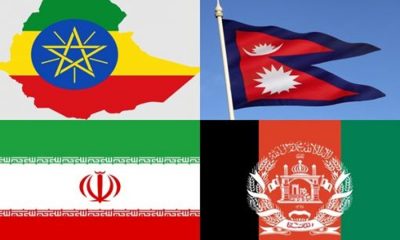
 metro2 days ago
metro2 days agoFour countries that won’t celebrate New Year
-

 metro2 days ago
metro2 days agoNigeria on life support when Tinubu took office – Akpabio
-

 metro2 days ago
metro2 days agoN180m not missing from my account, it was all a plan – Verydarkman
-

 metro2 days ago
metro2 days agoTinubu reveals Buhari’s role in commencement of Warri refinery operation
-

 Politics2 days ago
Politics2 days agoSeyi Tinubu death threat: Court fixes Jan 6 on Olamide bail application
-
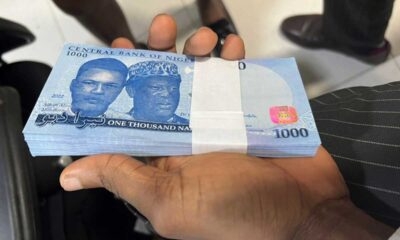
 News2 days ago
News2 days agoCurrency in circulation now N4.8tn – CBN report



